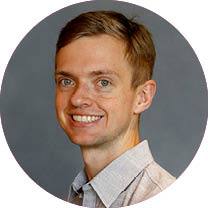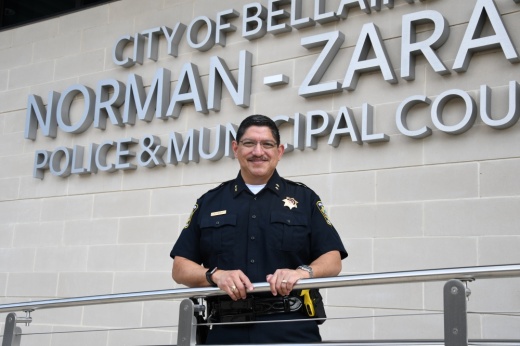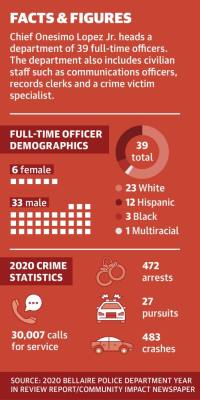Community Impact Newspaper spoke with Lopez in July to hear about his priorities ahead of his first day on Aug. 2. The conversation has been edited for length and clarity.
You are stepping into shoes once filled by Chief Byron Holloway. What are your thoughts on him and the legacy he left behind?
I think he has had a tremendous impact on the residents and the people that have come through the department because that is something he is great at: making those personal connections with people. We can talk about the new building, the training, the initiatives; we can talk about all of that, but that’s going to be the most lasting thing. It’s because people know him; people like him; people respect him. He’s had such a profound impact on so many people by helping develop them that that’s not going to be forgotten.What are your priorities going into your new role?
We need to do a better job of developing the next generation of leaders, passing on what we know to them, giving them that opportunity to grow, and challenging them outside their comfort zone. That’s something I’ve done as assistant chief and something I will continue to do as chief.There were a lot of things that Chief Holloway wanted to do. For example, to try and get the department into the Texas Police Chiefs Association Recognition Program. That’s something that is important for us to get back into because part of that recognition program was a complete rewrite of our existing policy manual to conform with the association’s best practices, which are informed by best practices from the U.S. Department of Justice and federal law enforcement agencies.
Policy improvement is another one, where policies are informed by things like the national discussion on police reform, which is something that we need to keep in mind and really need to keep watch of. While Bellaire is a small city within a bigger city, we are a law enforcement agency, and we have duties and responsibilities to the people we serve.
What other policies do you feel are important to address?
Something I read from a report from the Brookings Institution on police reform is near and dear to my heart: a national standard on training and de-escalation. We want to increase training on the things that are getting officers nationwide in trouble today: use-of-force incidents, shootings, how we handle mental health calls. Those are the things we need to be focusing on.We have a de-escalation program that is mandatory for officers to go through. We use a video simulator- based system that officers have to go through where they interact with the screen; an administrator will listen to what they’re saying, and so if the officers say the right thing, they’ll de-escalate the situation. Afterwards there’s a debrief.
There shouldn’t be a bare minimum of training. The Texas Commission on Law Enforcement requires a minimum of 40 hours of training [de-escalation included] for police officers over two years. That is incredibly low. I don’t think that’s enough. One of our initiatives is to mandate a minimum of 24 hours on those high-frequency, high-liability tasks every year for every officer.
What part does community outreach play in your priorities?
Something that I’m very interested in is a community outreach program. We haven’t been doing it enough. We had a community outreach officer before, and in my opinion, just was not used to its fullest potential. It was tailored to what we were able to do at the time.I know that we can be doing more. We do the Fire Truck Pull event every October, we’re working in conjunction with the Rotary for the annual Shop with a Cop—and those are great programs and we’re going to continue doing them—but there’s more we can be doing.
One thing that we started in July is Coffee with a Cop, an opportunity to pick a business here in town once a month every month where we go out there and we’ll have officers that will meet with citizens and allow those citizens to share their concerns and have their questions answered. We want it to be a non-confrontational, neutral environment with the end goal of creating a better relationship in the community. We want to build our existing relationships in the community, strengthen them, and we can only do that with direct interaction.
Another thing I want to do is a Citizen’s Police Academy. Other agencies do them, where you have members of the community attend training programs that show how the police operate, that lifts the veil of how we do things and why we do things.
Do you have any hiring goals that you would like to work on?
What’s important to remember is that we aren’t just people that work in the city, we work for the city. Something that is important to me is to make sure that the officers that work here reflect the community that we serve. And that’s not just the Bellaire community, but the southwest Houston community.What’s important is hiring for diversity. I’ve been working hard at doing that. In the last hiring cycle, we hired an African American officer, we hired a Hispanic officer and an Asian officer, and we have another Hispanic officer that starts in July. I think that’s wonderful, though I’d love to see more females in law enforcement.
We need to make sure we do a better job of getting out there and recruiting and showing potential officers how great this city is.






